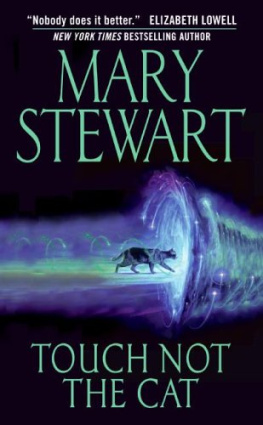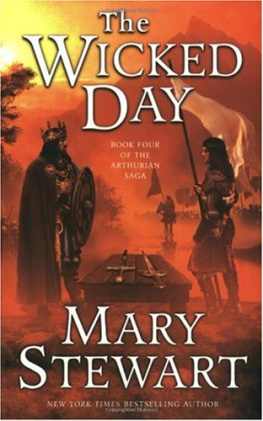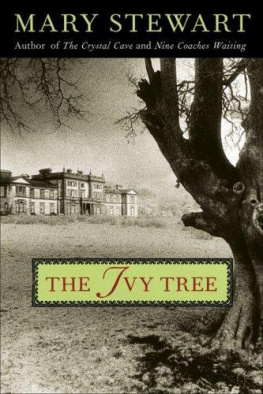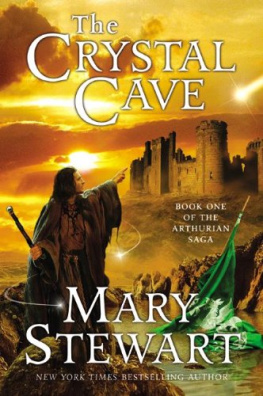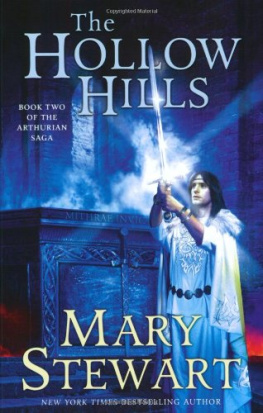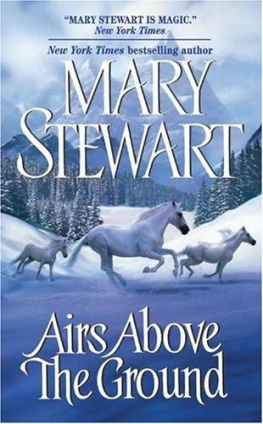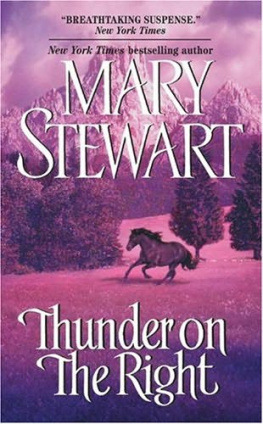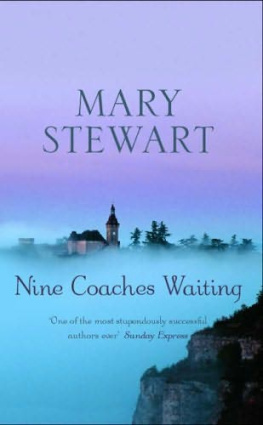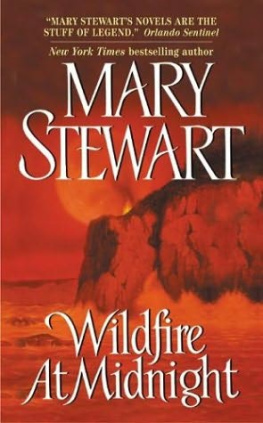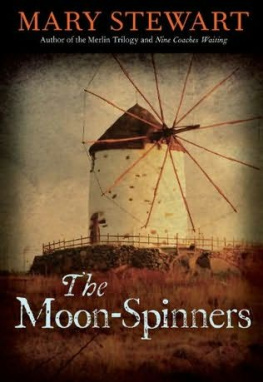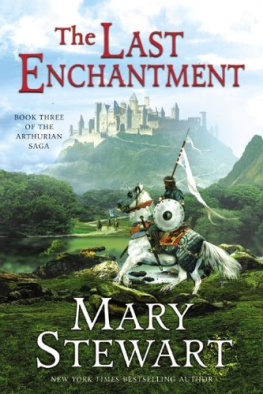Mary Stewart - Touch Not the Cat
Here you can read online Mary Stewart - Touch Not the Cat full text of the book (entire story) in english for free. Download pdf and epub, get meaning, cover and reviews about this ebook. year: 2005, publisher: HarperTorch, genre: Detective and thriller. Description of the work, (preface) as well as reviews are available. Best literature library LitArk.com created for fans of good reading and offers a wide selection of genres:
Romance novel
Science fiction
Adventure
Detective
Science
History
Home and family
Prose
Art
Politics
Computer
Non-fiction
Religion
Business
Children
Humor
Choose a favorite category and find really read worthwhile books. Enjoy immersion in the world of imagination, feel the emotions of the characters or learn something new for yourself, make an fascinating discovery.
- Book:Touch Not the Cat
- Author:
- Publisher:HarperTorch
- Genre:
- Year:2005
- Rating:5 / 5
- Favourites:Add to favourites
- Your mark:
- 100
- 1
- 2
- 3
- 4
- 5
Touch Not the Cat: summary, description and annotation
We offer to read an annotation, description, summary or preface (depends on what the author of the book "Touch Not the Cat" wrote himself). If you haven't found the necessary information about the book — write in the comments, we will try to find it.
Touch Not the Cat — read online for free the complete book (whole text) full work
Below is the text of the book, divided by pages. System saving the place of the last page read, allows you to conveniently read the book "Touch Not the Cat" online for free, without having to search again every time where you left off. Put a bookmark, and you can go to the page where you finished reading at any time.
Font size:
Interval:
Bookmark:
And some win peace who spend The skill of words to sweeten despair Of finding consolation where Life has but one dark end.
from "The Riddlers," by Walter de la Mare
It is my soul that calls upon my name.
Shakespeare: Romeo and Juliet (Act II, Sc. ii)
My lover came to me on the last night in April, with a message and a warning that sent me home to him.
Put like that, it sounds strange, though it is exactly what happened. When I try to explain it will no doubt sound stranger still. Let me put it all down in order.
I was working in Funchal, Madeira. Funchal is the main town of that lovely Atlantic island, and, in spite of its having been a port of call for almost every ship that has crossed the ocean since sometime in the fourteenth century, the town is still small and charming, its steep alleys tumbling down the lava slopes of the island's mountain spine, its streets full of flowers and trees, its very pavements made of patterned mosaic which glistens in the sun. I was working as receptionist and tourist guide at one of the new hotels east of the town. This sounds an easy job, but isn't; in tourist time, which in Madeira is almost the whole year, it is hard indeed; but what had led me to apply for the job was that very few qualifications seemed to be needed by a "Young lady of good appearance, willing to work long hours." Both these qualifications were mine; appearance was just about all I'd got, and I would have worked any hours to make some money. Whether I was the best for the job I don't know, but it happened that the people who owned the hotel had known my father, so I was hired. The old-boy network they call it. Well, it works, as often as not. You may not get the brightest and the best, but you do get someone who talks your own language, and who is usually someone you can get back at the way it will hurt, if they let you down.
It's barely a year since the things happened that I am writing about, but I find that I am already thinking of my father as if he were long gone, part of the past. As he is now; but on that warm April night in Madeira when my love told me to go and see him, Daddy was alive, just.
I didn't sleep in the hotel. The friends who owned it had a quinta, a country estate a few kilometers out of Funchal, where the pine woods slope down the mountains towards the sea. You reached the place by a lane which led off the Machico road, a steep grey ribbon of lava setts, bordered in summer with blue and white agapanthus standing cool against the pine woods, their stems vibrating in the draft of the running water in the levada at the road's edge. The house was big and rather ornate in the Portuguese style, standing in wide grounds full of flowers and carefully watered grass and every imaginable exotic shrub and flowering tree, dramatically set against the cool background of mountain pines. The owners lived there all winter, but at the beginning of April, most years, went back to England to their house in Herefordshire which lay just across the Malvern Hills from ours. They were in England now, and the quinta was shuttered, but I lived in what they called the garden house. This was a plain, single-story building at the foot of the garden. Its walls were pink-washed like those of the big house, and inside it was simple and barescrubbed floors and big echoing grey-walled rooms slatted all day against the sun, beautifully quiet and airy, and smelling of sunburned pines and lemon blossom. My bedroom window opened on one of the camellia avenues which led downhill towards the lily pools where frogs croaked and splashed all night. By the end of April the camellias are just about over, the browned blossoms swept away, almost as they drop, by the immaculate Portuguese gardeners; but the Judas trees are in flower, and the angel's-trumpets, and the wisteria, all fighting their way up through a dreamer's mixture of cloudy blossom where every season's flowers flourish (it seems) all year. And the roses are out. Not roses such as we have at home; roses need their cold winter's rest, and here, forced as they are into perpetual flower by the climate, they grow pale and slack-petalled, on thin, over-supple stems. There were roses on the wall of the garden house, moonbursts of some white, loose-globed flower which showered half across my bedroom window. The breeze that blew the rain clouds from time to time across the moonlight tossed the shadows of the roses over wall and ceiling again and again, each time the same and yet each time different, as the roses moved and the petals loosened to the breeze.
I was still awake when he came. He had not been to me for so long that at first I hardly recognized what was happening. It was just my name, softly, moving and fading through the empty room as the rose shadows moved and faded.
Bryony. Bryony. Bryony Ashley.
"Yes?" I found I had said it aloud, as if words were needed. Then I came fully awake, and knew where I was and who was talking to me. I turned over on my back, staring up at the high ceiling of that empty room where the moonlit shadows, in a still pause, hung motionless and insubstantial. As insubstantial as the lover who filled the nighttime room with his presence, and my mind with his voice.
Bryony. At last. Listen.... Are you listening?
This is not how it came through, of course. That is hard to describe, if not downright impossible. It comes through neither in words nor in pictures, butI can't put it any betterin sudden blocks of intelligence that are thrust into one's mind and slotted and locked there, the way a printer locks the lines into place, and there is the page with all its meanings for you to read. With these thought-patterns the whole page comes through at once; I suppose it may be like block-reading, though I have never tried that. They say it comes with practice. Well, he and I had had all our lives to practice; I had known him all my twenty-two years, and he (this much I could tell about him) was not much older.
I suppose that when we were children we must both have stumbled and made mistakes, as normal children do with reading, but I cannot remember a time when we couldn't confront each other, mind to mind, with ease. To begin with it seemed like sharing dreams, or having (as I believe is common among children) an imaginary companion who shared everything with me, and who was more real even than the cousins who lived near us, or than my friends at school. But, unlike most children, I never spoke about him. I don't think this was through fear of ridicule or disbelief; the experience was something I took very much for granted; but somehow, imposed over those thought-patterns, there was a censor which wouldn't allow me to share him with anyone else, even my parents. And the same censor must have worked with him. Never by the smallest sign or faltering of the patterns did he let me know who he was, though, from the shared memories that we had, I knew he must be someone close to me, and it was a safe bet that he was one of my Ashley cousins, who had played with me at Ashley Court daily when I was a child, and who had later on shared almost every holiday. It's a gift that goes in families, and there were records that it ran in ours: ever since the Elizabeth Ashley who was burned at the stake in 1623, there had been a record, necessarily secret, of strange
"seeings" and thought-transference between members of the family. By the same token my lover knew me, since I was the only Ashley girl, and for the last year or so had addressed me flatly as "Bryony."
There again, I only use the name for conven ience; you might almost say he called me "You," but in a manner which identified me fully. In return I called him "Ashley," in an attempt to make him identify himself. He never did, but accepted the name as he had accepted "Boy" and sometimes, in unwary moments, "Love," with the same guarded and gentle amusement with which he parried every attempt I had lately made to force him to identify himself. All I could get from him was the assurance that when the time was right we would know each other openly; but until that time we must be close only in thought.
Next pageFont size:
Interval:
Bookmark:
Similar books «Touch Not the Cat»
Look at similar books to Touch Not the Cat. We have selected literature similar in name and meaning in the hope of providing readers with more options to find new, interesting, not yet read works.
Discussion, reviews of the book Touch Not the Cat and just readers' own opinions. Leave your comments, write what you think about the work, its meaning or the main characters. Specify what exactly you liked and what you didn't like, and why you think so.

